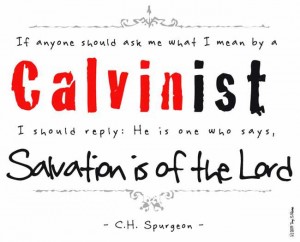 My friend John Hendryx writes:
My friend John Hendryx writes:
Predestination destroys legalism. If salvation is by Christ alone, it leaves no room for boasting or trusting in ourselves, even a little. It strips us bare and forces us to abandon all hope in our efforts or rules … man-made rules non-predestinarians tend to make to demonstrate they are more worthy than others of God’s grace (an oxymoron). The Scripture declares: “It is because of Him you are in Christ Jesus, who became to us wisdom from God, righteousness and sanctification and redemption, so that, as it is written, “Let the one who boasts, boast in the Lord.” (1 Cor 1:30-31)
This is not to say that Reformed people cannot be legalistic. Human beings find any way possible to do so, Reformed included. It means to say, rather, that if UNDERSTOOD CORRECTLY the doctrine of Grace ALONE in Christ ALONE will have the real effect of stripping us of legalism etc. Again only God’s grace can do so. This likewise was not an attempt to show Reformed superiority but the effect of a true understanding of the Bible will have on someone who beholds the majesty of God and is struck down by the fact that God will have mercy on whom he will have mercy.
———————-
After I wrote this, I had the following discussion ensue which I believe worth posting:
Visitor: Please explain to me what you mean by God will have mercy on who he will have mercy on. Would you try to say that God would send someone to hell without a choice of accepting and serving Him?
Response: Thank you for your question. First, “He will have mercy on whom he has mercy” are not my words but a direct quote from Scripture (Romans :9:15, 16). That being settled, let me answer your question…. everyone who hears the gospel are presented with the command or summons to believe. But according to the Bible, no one would ever respond positively to the gospel of Jesus Christ apart from the work of the Holy Spirit. Left to himelf, man is in bondage to his corruptions and does not understand or desire the true God and thinks that the gospel is folly (1 Cor 2:14). Only God can open his eyes, ears and heart to the gospel. Man’s moral inability to believe the gospel on his own does not alleviate him of the responsibility to do so. We owe a debt we cannot repay … but this does not make God change his standard for us. The debt MUST be repaid. So Jesus does for us what we are unable to do for ourselves.
Visitor: Thanks for your response. I would agree that the Holy Spirit convicts you of your need for Christ. But I find nowhere in the Bible that people are predestined to hell. God chose us in past eternity, Christ saved us at the cross, the Holy Spirit convicts us of our helpless state and need for salvation. If we don’t accept Christ as the only way to Heaven then we are doomed.
Response: Thank you.I would encourage you to read 1 Corinthians 1 & 2. Those who do not have the Holy Spirit, by nature, hate Spiritual truth. The Spirit merely convicting someone, as you say, does not make him love or trust in Christ. According to the Bible more needs to take place. His nature needs to be changed for this to even be a possibility, according to 1 Cor. So God has no need to actively predestine them to hell. They do very well choosing to go there themselves. That is the natural choice of everyone apart from God renewing their heart.
Jesus said “The Spirit gives life, the flesh counts for nothing …no one can come to me unless God grants it” (John 6:63, 65) and “all that the Father gives to me will come to me” (John 6:37).
These two statements made in the same discussion plainly show that no one can believe in Jesus unless God grants it through the quickening work of the Spirit …and all to whom he grants will believe.
It does not say some of those the Father gives Jesus will believe, but “all”. Also it clearly shows that they do not believe unless God first gives them to the Son. Jesus is not ambiguous here.
“The greatest judgement which God himself can, in the present life, inflict upon a man is, to leave him in the hand of his own boasted free-will.” – Augustus Toplady
Visitor: As you said you choose to go to hell but when convicted by the Spirit that you can’t get to Heaven without the free gift of Christ. You make a choice. I realize our flesh doesn’t naturally want Jesus. You hear the word the Holy Spirit shows you your need but there is free choice.
Response: I believe you are basing this idea on your assumptions and not on the text of Scripture. Can you from Scripture show where the Bible teaches free will anywhere?
God gives commands and imperatives, yes. But what we ought to do is not the same thing as what we are able to do. You speak as if God is under some kind of obligation. But God would be perfectly just if he decided to save no one. God gives either justice or mercy to people in this life, but no one gets injustice.
You have not interacted with any of the Scripture I showed you. You have only made orphaned assertions. Show me how you interpret John 6:63, 65, 37 and how my understanding is wrong. It says that the Spirit gives life or quickens and that no one can believe in Christ unless God grants this quickening. Not merely conviction.
Visitor: I don’t have the Bible in front of me to read the verses you gave. I didn’t say God was obligated to do anything. And I don’t seem to be wording things just right for you. So we may have to agree to disagree. As Warren Wiersbe said some things of God are a mystery. I don’t have the time or inclination at my time in life to argue such things when I can better spend my time worshiping and serving our Lord.
I would ask one more question did Adam and Eve choose to sin of their free will?
Response: Thanks again for you note…. Although I asked it of you, I see you were unable to provide any Scriptural evidence for your view of free will. You would think if it were true you would be able to come up with something off the top of your head since the Bible is such a voluminous work of God’s revelation to us. At least in a few places. Doesn’t that strike you as a little odd? If you cannot provide solid biblical evidence, we can only reason that you have built an entire view of Christianity based on a human tradition, not explicit ideas from Scripture. You are therefore basing your view of salvation on unaided assumptions, are you not?
Likewise, the passages I posted are not mystery but revealed Scripture. The Scripture speaks of these things plainly, so this is not about opinions or something God has left to mystery. I agree that there are mysteries in the Scripture but the doctrine of unconditional election and monergistic regeneration are not one of them since they are both revealed doctrines. I think if you are honest before God you would take the time in the Texts I posted to you to see what it says there and let them shape you. If Jesus thinks it is important enough to put in Scripture, that we are to read, then obviously it is not something he meant for us to avoid.
Finally, your question about Adam and Eve reveal that you have not really understood what is being said here. Adam and Eve were not in bondage to corruption. When we say men have no free will we are talking specifically about the state of man after the fall … Jesus said he who sins is a slave to sin. And that which is a slave is not free. Only Christ can set us free. Thus when we say men have no free will we are not speaking of coercion… that God somehow coerces us to reject him. The history of this doctrine is about the nature of man. He is not free because, by a necessity of his fallen nature, he is in bondage to sin. He is dead in sin, without the Holy Spirit, so he rejects Christ of necessity, not because God forces him to reject Him.
Augustine once said, “Through freedom man came to be in sin, but the corruption which followed as punishment turned freedom into necessity.” In other words, before the fall men were “able to sin and able not to sin” – . After the fall, men are “not able not to sin.” So the question you are asking misunderstands the question at hand. Those who are not able not to sin have no free will to believe the gospel. Left to themselves men hate Christ and will not come into the light (See John 3:19, 20)
Hope this helps and clarifies.
JWH

 I understand your perplexity. It takes time to sort through the things you’ve been taught and separate traditions from valid doctrines. One of the most difficult aspects of learning and embracing what the Bible actually says is un-learning our traditions, assumptions, and presuppositions.
I understand your perplexity. It takes time to sort through the things you’ve been taught and separate traditions from valid doctrines. One of the most difficult aspects of learning and embracing what the Bible actually says is un-learning our traditions, assumptions, and presuppositions. I speak for many when I say that I have not always embraced the doctrines of grace or what is commonly called Calvinism. Its actually unfortunate that a man’s name is associated with the doctrines that came out of the Protestant Reformation. Calvin was not the first to articulate these truths, but merely was the chief systematizer of such doctrines. There was actually nothing in Calvin that was not first seen in Luther, and much of Luther was first found in Augustine. Luther was an Augustinian monk, of course. We would also naturally affirm that there was nothing in any of these men that was not first found in Paul and Peter and John in the New Testament.
I speak for many when I say that I have not always embraced the doctrines of grace or what is commonly called Calvinism. Its actually unfortunate that a man’s name is associated with the doctrines that came out of the Protestant Reformation. Calvin was not the first to articulate these truths, but merely was the chief systematizer of such doctrines. There was actually nothing in Calvin that was not first seen in Luther, and much of Luther was first found in Augustine. Luther was an Augustinian monk, of course. We would also naturally affirm that there was nothing in any of these men that was not first found in Paul and Peter and John in the New Testament.